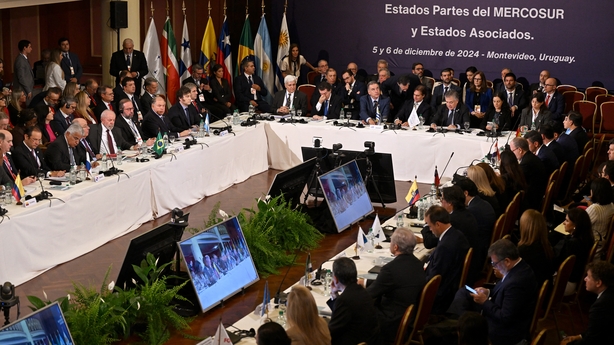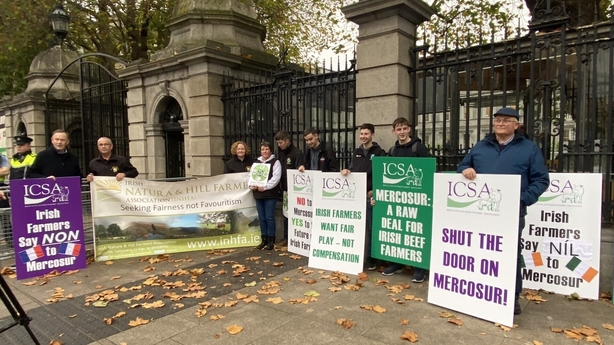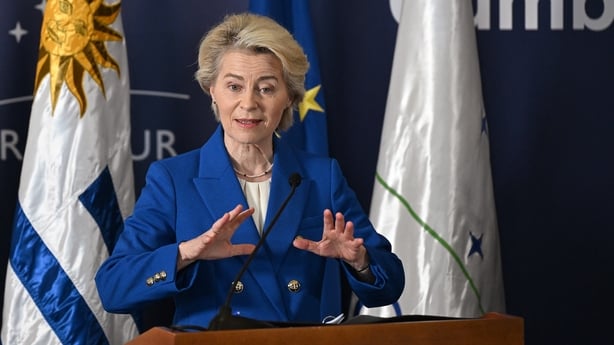European Commission President Ursula von der Leyen has hailed the Mercosur trade deal as a "win-win agreement".
The European Union and South American countries reached agreement on a free trade treaty earlier.
Ms Von der Leyen, who travelled to Uruguay to finalise the long-delayed deal, described it as "a win for Europe".
She called the agreement - which has been nearly a quarter of a century in the making - "a truly historic milestone" that builds trade bridges at a time when "strong winds are blowing in the opposite direction, towards isolation and fragmentation."
While negotiations have concluded, the EU-Mercosur deal still needs to be greenlit by at least 15 of the European Union's 27 member nations representing 65% of the EU population.
Spanish Prime Minister Pedro Sanchez called the conclusion of the controversial free-trade "a historic agreement".
"Today, the European Union has achieved a historic agreement with Mercosur to establish an unprecedented economic bridge between Europe and Latin America," he wrote on X.
Today, the European Union has achieved a historic agreement with Mercosur to establish an unprecedented economic bridge between Europe and Latin America.
— Pedro Sánchez (@sanchezcastejon) December 6, 2024
Spain will work to ensure that this agreement is approved at the Council, because trade openness with our Latin American…
However, French President Emmanuel Macron repeated a warning yesterday to Ms von der Leyen that the agreement was "unacceptable in its current state."
Poland has rallied to France's side, and Italian government sources say Rome believes "the conditions are not met" to back the deal. The Netherlands and Austria have also expressed reservations.
But Germany, desperate to open more trade opportunities amid gloom for its manufacturing sector, had strongly come out in favor of the deal, as had Spain.

Ms Von der Leyen arrived hours after President Emmanuel Macron's government collapsed following a no-confidence vote in parliament over efforts to rein in France's budget deficit, leaving Mr Macron scrambling to name a new prime minister.
The deal, 20 years in the making and deeply divisive in Europe where farmers and Paris have been the loudest voice in opposition, creates one of the world's largest trade partnerships and turbocharges the flow of beef and grains.
Mercosur, including farming powerhouses Brazil, Argentina, Uruguay and Paraguay, is holding a planned summit in Montevideo.

Ms Von der Leyen, just days into her second term, faces stern opposition at home to the deal - the largest struck by the EU in terms of tariff reductions.
Member states as a whole and the European Parliament will have to approve the agreement.
European farmers, including Irish farmers, have repeatedly protested against it, saying it will lead to cheap imports of South American commodities, notably beef, which is not subject to the same green and food safety standards as in the EU.
Read more: The Mercosur trade deal: all you need to know
Message to EU farmers
The broad outlines of a deal were agreed back in 2019 but it was never ratified amid concerns over the impact of Brazilian farming on climate change, among other factors.
Ms von der Leyen nodded to that preoccupation, saying: "The EU-Mercosur agreement reflects our steadfast commitment to the Paris Agreement (on fighting climate change) and to the fight against deforestation."
She said efforts being made by the government of Brazilian President Luiz Inacio Lula da Silva to protect the Amazon "are welcome, and they are necessary - but preserving the Amazon is a shared responsibility of all humanity."

The EU Chief also singled out European farmers, telling them: "We have heard you, listened to your concerns, and we are acting on them.
"This agreement includes robust safeguards to protect your livelihoods."
The deal, once ratified, would allow the EU to export cars, machinery and pharmaceutical products more easily to South America.
In return, Brazil and its neighbors would be able to sell meat, sugar, rice, honey, soybeans and other products to Europe with fewer restrictions.
The treaty aims to eliminate most import taxes between the EU and Mercosur to create a vast free-trade area of more than 700 million consumers.
Sources familiar with the negotiations said the deal would include changes to "several chapters," including government contracts, services, intellectual property and the environment.
IFA has 'huge' concerns about Mercosur deal
President of the Irish Farmers Association, Francie Gorman, said he has "huge concerns" about the Mercosur deal and he does not know if the support is there in Europe to get it over the line.
Speaking on RTÉ's Today with Claire Byrne, he said the leaders of Fianna Fáil, Fine Gael and Sinn Féin indicated that they would oppose the deal.
"The time is now for them to show that they support rural Ireland," he added. "A week after people voted, is it credible that they will now turn their backs on rural Ireland?"
"This about more than just about beef farmers and poultry farmers, it's about the economic activity in rural Ireland and the knock on effect that that's going to have as well," Mr Gorman stated.
Mr Gorman said that while there are winners and losers in every trade deal, agriculture "shouldn't be the sacrificial lamb".
He said there are grave concerns about the ability of agencies in Brazil to verify that their beef comes from hormone-free animals and from land that is not deforested.
Meanwhile, Declan Hanrahan, Chair of the IFA's National Livestock Committee, said the Mercosur deal has the potential to destroy important markets.
Speaking on RTÉ's Morning Ireland, Mr Hanrahan said the standards and traceability that we have in Europe "are not there" in Brazil and Mercosur countries.
We need your consent to load this rte-player contentWe use rte-player to manage extra content that can set cookies on your device and collect data about your activity. Please review their details and accept them to load the content.Manage Preferences
He said the deal would put 100,000 tonnes of cheaper beef onto the European market, which could have a "devastating effect" on Irish and European producers.
"The most important thing is the regulation and traceability, which is not in place for the beef that's coming in from Brazil," he said.
"They're not able to stand up to the same standards as we do in Ireland and across Europe," he added.
Speaking on the same programme, Fine Gael MEP Sean Kelly agreed that there are concerns about how the Mercosur deal would impact agriculture.
He said that while there would be guarantees about sustainability, Brazil "is as big as Europe".
"Then you have Argentina, Paraguay, Uruguay and Bolivia also involved," he added. "How can it be verified? That's going to be a crucial aspect because I don't think it's really possible to do that."
Mr Kelly said it would be his inclination at the moment to vote against the deal but that he would see what Ms von der Leyen has to say.
He said that if the deal would have a "devastating effect" on the Irish beef industry then he could not support it but he will look at it in a "practical and logical way".
"But I'm leaning towards voting against it at the moment," he added.

